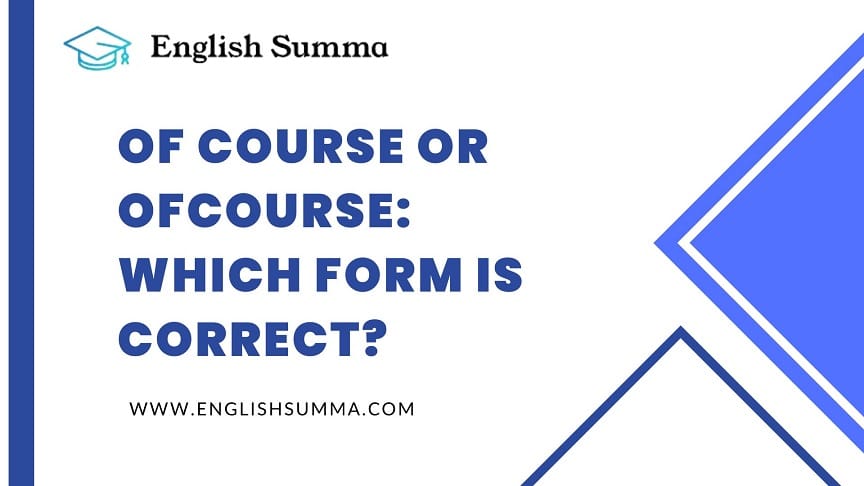The correct form is “of course” (two words). “Ofcourse” is a common misspelling. As experts in English language and philology, it’s important we get simple compound words like this right in our own writing and text.
“Of course” is a phrase that means “definitely; yes; certainly.” For example:
Of course I’d like to go to the movies with you!
Of course the weatherman was wrong again.
Meanwhile, “ofcourse” has no meaning. It is simply an incorrect spelling of the term “of course.”
Is it Ninth or Nineth? Avoid this common mistake!
Why is “of course” two words instead of one?
“Of” is a preposition that means “from” or “belonging to.” “Course” in this context means “path” or “direction.” So “of course” literally means something like “belonging to the path/direction.”
Over time, English speakers contracted this phrase to mean “obviously; definitely” in a more figurative sense. But we still spell it as two separate words.
Let’s look at some example scenarios where people often misspell “of course” as “ofcourse”:
In informal writing/texts
Jenny: Want to grab dinner later?
Mike: Ofcourse! What time?
Here, Mike has incorrectly written “ofcourse” as one word. The correct form would be:
“Of course! What time?”
In informal contexts like texts or emails, people often try to save time by condensing words. But “of course” should still remain two words.
Is it Trainning or Training – Avoid This Critical Mistake!
In formal writing
I plan to attend law school. Ofcourse I will need strong letters of recommendation.
Using “ofcourse” in any formal writing, whether for school or professional purposes, comes across as sloppy. The correct form, “Of course I will need strong letters,” is two words.
In social media captions/posts
Omg just won free tickets to Taylor Swift! Ofcourse I’m going!
With the prevalence of social media, we may feel tempted to use quicker spellings in captions and posts. But opting for the proper spelling, “Of course I’m going!” makes the best impression.
No matter how casually we may be writing elsewhere, avoiding common errors like “ofcourse” helps strengthen our broader language skills.
Don’t get confused and learn what’s correct: Puting or putting?
Similar misspellings
“Ofcourse” is often confused with other incorrect forms:
- Ofcorse
- Offcourse
- Ofcoarse
However, all these variations stray from the correct two-word form:
- Of course
Let’s look at some examples:
Ofcorse I don’t mind driving you to the airport. (Incorrect)
Of course I don’t mind driving you to the airport. (Correct)
Offcourse you can borrow my car for the day. (Incorrect)
Of course you can borrow my car for the day. (Correct)
No other spellings besides “of course” are accepted as correct in this phrase.
Read more about the correct spelling of Shiney or Shiny
When to use “of course” vs. other terms
“Of course” has several similar expressions and synonyms conveying the same meaning:
- Certainly
- Definitely
- For sure
- Absolutely
- Clearly
- Obviously
- Indeed
- Sure
- Yes
- Yeah
- Yep
For example:
Can you pick up some milk on your way home?
“Of course,” she replied.
“Sure,” she replied.
“Definitely,” she replied.
All these responses mean the same thing. However, “of course’ sounds most natural as a short affirmative reply.
In your own writing, mix up these terms and synonyms for variety. But always use the two-word “of course’’ spelling for that exact phrase.
Read this article if you are confused about using correct form of Quite or Quiet
Common uses of “of course”
Since “of course” signals something obvious or already agreed upon, we often use it to:
- Politely agree to requests and offers: Can you help me move this weekend? Of course, I’d be happy to help!
- Express that something is evident: Of course we need to prepare more with the big meeting coming up.
- Graciously accept praise or thanks: Thank you for this lovely gift! Of course, you deserve it!
- Show sensitivity by acknowledging others’ feelings: I know you’re disappointed you didn’t get the job. Of course, anyone would be in your shoes.
The right situations for “of course” come naturally with practice. Just be sure when writing or typing, you keep it as two words!
Conclusion
Whether making weekend plans, posting on social media, or writing formally, the only correct form for this common phrase is “of course” (two words).
“Ofcourse” and other variations like “ofcorse” are incorrect spellings. So proofread your writing to fix any errors.
Using proper grammar and spelling even with everyday terms demonstrates strong overall language skills as a writer. So master common phrases like “of course’’ early on.
And of course, with consistent practice and attention to detail, you’ll get the hang of basic compound words and prevent mistakes like “ofcourse” in your writing.
I hope these examples and scenarios have clarified the difference. Let me know if you have any other questions!

Emily Hudson, the creative mind behind “English Summa,” is a passionate English language educator with a Bachelor’s Degree in English and a Teaching Certification. Dedicated to making the intricacies of English accessible to learners, Emily brings a blend of expertise and enthusiasm to her readers. Follow English Summa for insightful language tips, literary explorations, and a shared love for the beauty of English.

